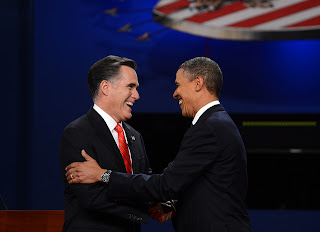I caught the tail end of the presidential debates tonight. As a gun violence researcher, I enjoyed that someone in the town hall crowd asked both candidates about their position on gun control. Although the debates have focused heavily on the economy and foreign policy matters, I believe that gun violence in our cities is a critically important domestic issue.
Here's a quick recap of my reactions:
I liked Obama's response. He talked about how gun violence prevention could begin in schools, and how faith-based organizations and law enforcement could help curb this problem. We didn't get to hear specifics about how he would do this, but if this is what he plans on doing, I think he's right on the money.
Romney's response puzzled me a little. He seemed to tow the conservative line of not wanting to scare away the powerful gun lobby and made sure to say that he wouldn't introduce new gun legislation. This was predictable. But, what about his comment on how gun violence could be linked back to single-parent households? I'm not saying that families aren't important, but what exactly is the causal link here? Hearing him talk about gun violence as a symptom of single-parent homes should make lots of people squirm (particularly single-parent homes). He didn't come out and say it, but his comments were right in line with the well-rehearsed "culture of poverty" thesis, which has been roundly criticized and debunked by sociologists for the past 30 years.
If we are to infer from his remarks, we could guess that Romney believes that gun violence is the outcome of parents who aren't invested in their kids, and who are morally bankrupt and divorced. Nevermind institutional racism, declining infrastructure, disappearing work opportunities, and a litany of other structural problems that affect the populations living in areas with the highest rates of gun violence. Romney's comments seem so out of touch with inner-city realities, but then again, what should we expect from a guy who has written off 47%?
How do other people feel about their responses?
I also found that both candidates sort of paid lip service to commentary that emerged in the wake of the Aurora shootings. After the mass shooting, pundits and policymakers began another familiar trope in American culture: The problem isn't guns, it's guns in the wrong person's hands. Just about every politician speaking out on the shootings dropped a line about mental health care reform. While I agree that we need to revamp our mental health care system (in terms of increasing access and coming up with more creative ways to deliver care), both candidates seemed to suggest a platform that would involve better screening measures to ensure that people with histories of mental illness can't buy guns. I think this is a slippery slope. How would this kind of program work? People who are insured are using mental health care at historically unprecedented rates; the stigma of having anxiety, depression, and many mental health conditions don't exist anymore (or they're at least more widely accepted conditions). What would this system look like? How would it work?
In the end, I'm just happy that gun violence got a brief--albeit hurried--moment in the debates. I'm curious to hear how others feel about each candidate's remarks.
 |
| All smiles |
I liked Obama's response. He talked about how gun violence prevention could begin in schools, and how faith-based organizations and law enforcement could help curb this problem. We didn't get to hear specifics about how he would do this, but if this is what he plans on doing, I think he's right on the money.
Romney's response puzzled me a little. He seemed to tow the conservative line of not wanting to scare away the powerful gun lobby and made sure to say that he wouldn't introduce new gun legislation. This was predictable. But, what about his comment on how gun violence could be linked back to single-parent households? I'm not saying that families aren't important, but what exactly is the causal link here? Hearing him talk about gun violence as a symptom of single-parent homes should make lots of people squirm (particularly single-parent homes). He didn't come out and say it, but his comments were right in line with the well-rehearsed "culture of poverty" thesis, which has been roundly criticized and debunked by sociologists for the past 30 years.
If we are to infer from his remarks, we could guess that Romney believes that gun violence is the outcome of parents who aren't invested in their kids, and who are morally bankrupt and divorced. Nevermind institutional racism, declining infrastructure, disappearing work opportunities, and a litany of other structural problems that affect the populations living in areas with the highest rates of gun violence. Romney's comments seem so out of touch with inner-city realities, but then again, what should we expect from a guy who has written off 47%?
 |
| AK-47: a revolutionary firearm |
I also found that both candidates sort of paid lip service to commentary that emerged in the wake of the Aurora shootings. After the mass shooting, pundits and policymakers began another familiar trope in American culture: The problem isn't guns, it's guns in the wrong person's hands. Just about every politician speaking out on the shootings dropped a line about mental health care reform. While I agree that we need to revamp our mental health care system (in terms of increasing access and coming up with more creative ways to deliver care), both candidates seemed to suggest a platform that would involve better screening measures to ensure that people with histories of mental illness can't buy guns. I think this is a slippery slope. How would this kind of program work? People who are insured are using mental health care at historically unprecedented rates; the stigma of having anxiety, depression, and many mental health conditions don't exist anymore (or they're at least more widely accepted conditions). What would this system look like? How would it work?
In the end, I'm just happy that gun violence got a brief--albeit hurried--moment in the debates. I'm curious to hear how others feel about each candidate's remarks.
Comments
Post a Comment